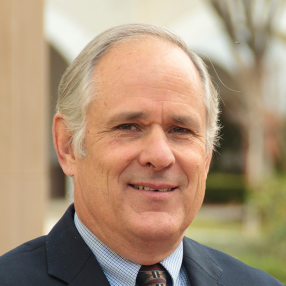Curriculum Vitae
B.A., Thomas Aquinas College, 1975; C. Phil., University of California, Los Angeles, 1980; Ph.D., biology, University of California, Los Angeles, 1986; Instructor in Philosophy, Niagara University, 1975; California Graduate Fellow, 1977–80, Teaching Assistant 1979, Teaching Associate, 1979–80, Teaching Fellow, 1980–82, Biology, University of California, Los Angeles; Tutor, Thomas Aquinas College, 1982–; Associate Dean, Thomas Aquinas College, 2019-2020; Dean, Thomas Aquinas College, New England, 2020-2022 .
Profile
When he was a student at Thomas Aquinas College, Thomas J. Kaiser was most interested in philosophy and theology, especially the philosophy of nature. “I was struck by how important the study of nature was for doing theology,” he said. “That nature acts for an end is most evident in living things. This teleological framework, of course, points to God. I find now even as a tutor that principles we face in the lab are often brought to bear in theology.”
Tom was interested in nature growing up in Bakersfield, Calif. When he wasn’t out playing sports, he would be found checking out the habitats of birds and mammals along the banks and open country of the Kern River near his home. He became interested in falconry when he was 13 and maintains that interest today. “I hated biology in high school,” he said. “We never saw a single living organism. We were always pulling one out of formaldehyde.”
Tom was so enamored of his experience at the College that, after he graduated in 1975, he thought he might like to come back and teach. After a misspent semester studying philosophy in the East, he began taking some undergraduate courses in biology at California State University, Bakersfield, and worked at a cotton research station run by the University of California, Davis. He also spoke with College founders Dr. Ronald P. McArthur and Marcus R. Berquist, and discussed getting a doctorate in biology, then returning to the College to teach. None of the tutors as yet had expertise in that area.
On their encouragement, Tom then applied for and was accepted into the doctoral program in biology at the University of California, Los Angeles. He completed his coursework in 1982 and obtained his doctorate in 1986. His dissertation, “The Behavior and Energetics of Prairie Falcons Breeding in the Western Mojave Desert,” was a groundbreaking study in energetic efficiency that confirmed a hypothesis of why certain female falcons are larger than males.
Dr. Kaiser returned to the College to teach in 1982 and began to help overhaul the laboratory and science curriculum for the freshmen and sophomore years. He introduced a more complete program of biology, still starting with J. Henri Fabre and asking “Where is the proper place to begin the study of biology?” He recommended expanding readings in Harvey and Galen (to discuss anatomy and physiology, the motion of the heart and blood, and animal generation), Linnaeus (to discuss the naming and classification of organisms), Driesch (to discuss embryology and vitalistic theories), Goethe (to discuss the metamorphosis of plants), and Aristotle (to discuss the principles and methods of science). He also recommended field trips to examine and collect insects, class dissection of a sheep heart, and lab exercises in embryology and plant anatomy. The faculty adopted his recommendations.
Some thirty years later, at the close of the Spring 2012 semester, Dr. Kaiser achieved a remarkable feat — becoming the first Thomas Aquinas College tutor to have taught all 23 courses in the College’s classical curriculum. “I intended to teach the whole program when I came back here as a member of the faculty,” he notes. “As a student I felt like I had only skimmed the surface of the material we studied here. So one of the things I had in mind when I came back was to do it all over again and try to do it more deeply.”
Having taught across the disciplines, he says, gives him greater insight into the value of an integrated curriculum. “In your average college biology course, the philosophy of nature is never discussed, but all of the assumptions are still there and everything will be taught in light of those assumptions,” he notes. “That is why a good science program is indispensable to a good liberal arts program. The connection between natural science and philosophy must be understood before one can fully appreciate the connection between faith and reason.”
Dr. Kaiser married his classmate Paula Grimm, and they have raised 11 children together. If you wander out back behind the Kaiser homestead in Upper Ojai, you will find them raising at any given time falcons, hawks, pigeons, pheasants, quail, ducks, chukars, cockatoos, dogs, rabbits, and various reptiles. For Dr. Kaiser, these creatures are all reminders of God’s presence around him.
Lectures & Talks
- Theological Faith and Catholic Liberal Education, August 30, 2019








